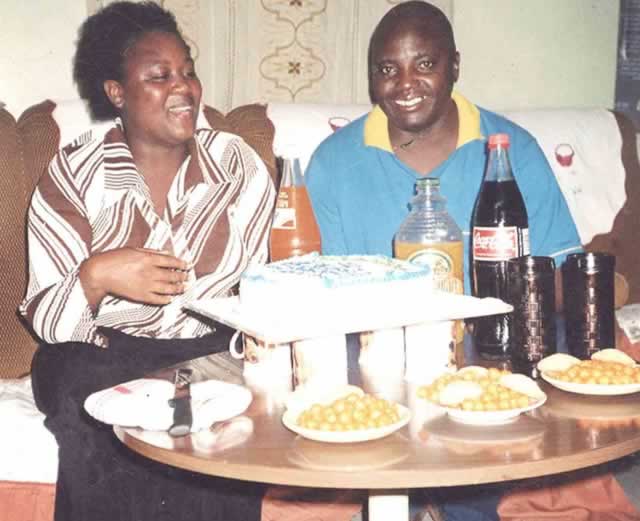Hubby stabber: From victim to villain

Ruth Butaumocho Gender Editor
JANUARY 1, 2015 marked the 36th birthday of Chitungwiza woman Fortunate Nsoro.
Instead of celebrating her birthday and the coming of a new year, Fortunate took an overdose of malaria tablets, intending to end her life.
She was only saved by neighbours who rushed her to hospital. A week later, and still recuperating, she became more daring.
Fortunate tried to drown herself in Manyame River, again only to be saved by an alert cyclist who knocked her down preventing her from plunging into the river.
However, a month later, Fortunate stopped playing the victim and turned villain. On February 26, she allegedly stabbed to death her husband Petros Mutasa with kitchen knives.
Mutasa is survived by five children.
The murder shocked the nation, particularly friends and relatives, who knew Fortunate as a chirpy socialite and a good yesteryear sportsperson.
Growing up in Mufakose, Fortunate was revered as a good discus thrower, while her parents marvelled at her ability to grasp Sunday school verses better than anyone else.
So what could have changed her persona and triggered such animosity within her, which resulted in the death of her husband and plunged the whole neighbourhood into mourning?
Was it a fit of pique?
Fortunate’s younger sister, Matilda opened up about her sister’s woes, alleging that Fortunate’s second marriage was not rosy. Anger, disappointment and mounting pressure to keep her marriage intact against a myriad of problems between the two could have triggered the incident, which resulted in the brutal murder of Mutasa.
“The two had a good relationship. They were married for close to a decade. It was my sister’s second marriage and Mutasa’s fourth. It was late last year when their marital woes worsened after reports of her husband’s infidelity started emerging.
“Beginning of this year, she (Fortunate) phoned me several times, alleging that her husband was in a serious relationship with a woman who worked at a bar at Chikwanha Shopping Centre.
“I advised her not to visit the woman and instead talk to her husband. From that time she appeared troubled, and tried to commit suicide twice. I even spoke to Mutasa about it and he promised to talk to her,” said Matilda.
Matilda added that Fortunate’s growing suicidal tendencies prompted her family to encourage her to go for counselling sessions with priests at her local parish, St Monica (Roman Catholic).
“Throughout the discussions we often had, I kept reminding her of the Christian values that our mother taught us and the importance of the family unit, since we did not grow up in a broken home.
“Having had a failed marriage before, Fortunate tried hard to keep her marriage intact, but it was clear that the pressure was taking a toll on her, hence the attempts to take her life,” revealed Matilda.
Matilda added that although the relationship continued to be tumultuous, Fortunate maintained her suave and chirpy character and was often in a good mood when interacting with friends, colleagues and stepchildren.
“Fortunate is and has always been a good woman, a darling of the family, who also got along well with all her stepchildren,” she said.
Mutasa’s daughter from his first marriage Shylet (31) collaborated Matilda’s assertion, describing her stepmother as a cheerful individual, although she occasionally exhibited bouts of anger.
“I am still in shock. I never expected this. This is the part of her character that I didn’t know or which she never exhibited,” said the distraught Shylet in an interview at the family’s house in Chitungwiza on Wednesday. From the time that she got married to my father, she has always been a friendly person, whom I could turn to for advice whenever I faced problems in my marital and social life.
“Like any other couple, mainini and my dad had their fair share of problems, but they always resolved them amicably. They led a peaceful life,” said Shylet, who lives with her husband, just a stone’s throw away from her parents’ house. Fortunate’s workmates at Michael Gelfand Clinic were equally shocked when news of the alleged murder broke out. One of her workmates, Spiwe Njowa (40) of Hatfield, said during the time she interacted with Fortunate, she was always chatty, happy and never showed any signs of distress.
“It was only on one occasion that she complained about one of her stepsons, but we counselled her, and everything had been normal since that time” she said.
In Fortunate, her mother–in-law, 71-year old Erica Mutasa, saw an embodiment of a true traditional African woman whom she felt had the potential to bring stability into her son’s life, after three failed marriages.
“If they had problems, we did not suspect anything. She was the mother figure of the entire family and even took care of the children from her husband’s first marriage,” said Mbuya Mutasa between tears.
It came as a shock to Mbuya Mutasa when on the eve of February 26, she received a phone call from Fortunate, saying the two had fought at their Chitungwiza home, before she cut off the conversation, abruptly.
Unbeknown to her, her son was lying in a pool of blood, while neighbours and relatives tried to come to terms with the incident.
“Up to now I do not understand what spirits could have possessed her, and made her fight to this extent,” said Mbuya Mutasa.
However, one of Fortunate’s stepson Stallone had a different story to tell.
Twenty two-year-old Stallone said her stepmother had always been a temperamental person and often resorted to violence when solving problems.
“Whenever we had problems, she would often lock me up in the bedroom to punish me. Sometime last year, we argued over a cart that I had rented out to our neighbours who wanted to use it to collect water. I tried to explain that to her, but she wouldn’t listen. In a fit of rage, she picked up a mirror from the bed, threw it at me, cutting my back in the process,” he said.
Domestic violence has been on the increase in Zimbabwe.
Several men and women have in the last few months committed suicide or killed their partners following long standing dispute in relations, unions and marriages.
Police have confirmed an increase in the number of people who are taking their lives after or killing their partners after failing to resolve problems within their unions.









Comments